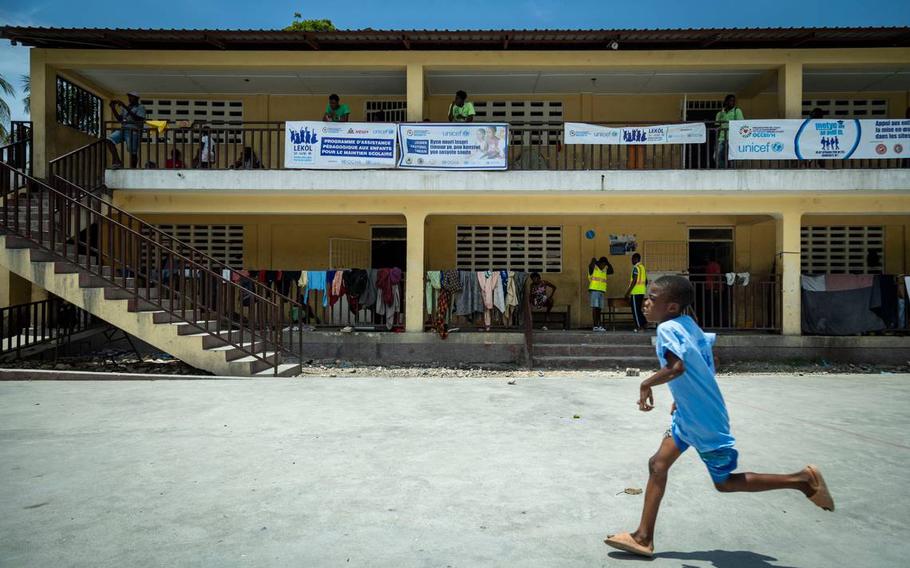
Haitians who have been forced to abandon their homes due to gang violence have sought refuge at the Ecole National Joseph C. Bernard DeFreres displacement camp in Port-au-Prince rather than face the consequences of staying in gang-occupied territory. (Jose Iglesias, The Miami Herald/TNS)
(Tribune News Service) — The number of Haitians who have been forced to flee their homes by gang violence tripled over the past year, bringing the number to more than 1 million, the International Organization for Migration, a United Nations agency, said Tuesday.
The latest information reveals that 1,041,000 people, many of whom have been displaced several times, are struggling amid an intensifying humanitarian crisis and widening gang violence, the U.N. agency said in a release.
“Children bear the greatest burden of displacement, making up over half of the displaced population,” the U.N. migration agency said.
The figure represents the highest recorded number of displacements due to violence in Haiti, which last year led to the deaths of more than 5,600 Haitians, the U.N. said. The migration office the rising number of homeless people underscores the urgent needs for assistance, and represent a threefold increase in displacements within a year, rising from 315,000 in December 2023.
In Port-au-Prince alone, where the largest number of homeless are located, displacements have nearly doubled, fueled by the relentless gang violence, the collapse of healthcare services and worsening hunger.
In the Artibonite region to the north of the capital, displacement tripled in 2024, reaching over 84,000 people, highlighting the spread of violence beyond Port-au-Prince.
“Haiti needs sustained humanitarian assistance right now to save and protect lives,” said migration office Director General Amy Pope. “We must work together to address the root causes of the violence and instability that has led to so much death and destruction.”
The disturbing new figures are inching close to the same number of people — 1.5 million— who were internally displaced by Haiti’s cataclysmic earthquake, which struck 15 years ago on Jan. 12, 2010.
The displacement sites where people have been forced to live are not what they were in the aftermath of the quake, however. They are in many instances worse, with rats and mice running throughout, and lack access to regular garbage collection, tarps, clean water, food or latrines. Fights, rapes, and violence are also a frequent occurrence in the makeshift shelters where people also face health risks because of the lack of sanitation.
“The security of displaced people is not a priority for state authorities,” the National Human Rights Defense Network in Haiti said in a separate report on conditions in the displacement camps.
The report found that displaced people are living in some of the worst conditions imaginable as they camp out in school and church yards, public spaces and anywhere they can find a spot to live away from armed gangs. They are not only being neglected by the government, the group said, but the assistance provided by aid groups, where it exists, remains insufficient.
“Bathing spaces are almost non-existent and, their arrangement presents a danger for women and girls who cannot frequent them at night,” the Port-au-Prince human rights group said in a report that examined 59 of 117 displacement camps located throughout the capital and the neighboring Artibonite region. “In 5% of the sites monitored, men congregate near the showers to harass the women and girls who go there.”
“The government, once again, leaves this responsibility to private and non-governmental organizations whose efforts, also on this level, remain insufficient, given the density of the population to be served,” the report said.
The report found that 5% of the camps were created right after the quake in 2010, while an overwhelming number have sprouted up in response to the widespread gang violence that has forced Haitians to flee their homes and neighborhoods. Of the sites surveyed, 54% came into existence last year, while 27% were formed in 2023 and 14% created between 2021-22.
“The consequences of this insecurity situation are enormous on the functioning of schools. Indeed, 39% of the monitored [shelters] are schools, compared to 34% which are made up of vacant lots and abandoned houses,” the human-rights group said. “The other 27% sites are scattered” among churches, political party premises, state institutions, entertainment venues and at least one orphanage and a health center.
The human rights group called on the government to take care of all displaced people and coordinate the humanitarian aid offered by private and non-governmental organizations.
“Treat displaced people with respect for their human dignity and their fundamental rights to health, food, education and a healthy environment,” the report said. “Do everything possible to ensure the safety of people living in sites hosting displaced people and invite community police to take control of these spaces.”
The U.N report noted that many people who have been displaced have sought refuge in Haiti’s provinces, relying on overwhelmed communities and straining limited resources in areas that were already struggling after being cut off from the capital by gang control of roads.
“Compounding this crisis, 200,000 Haitians were deported back to Haiti last year, further placing an even greater strain on the country’s already overwhelmed social services,” the U.N agency said.
Despite the challenges, the U.N. migration office said it continues to deliver critical support.
“Our teams are on the ground every day providing clean water, medical care and shelter, but the demands are growing rapidly,” said Grégoire Goodstein, the head of the U.N. migration office in Haiti. “With the right support, we stand ready to further expand our efforts, address urgent needs, and help Haitians rebuild their lives.”
©2025 Miami Herald.
Visit miamiherald.com.
Distributed by Tribune Content Agency, LLC.